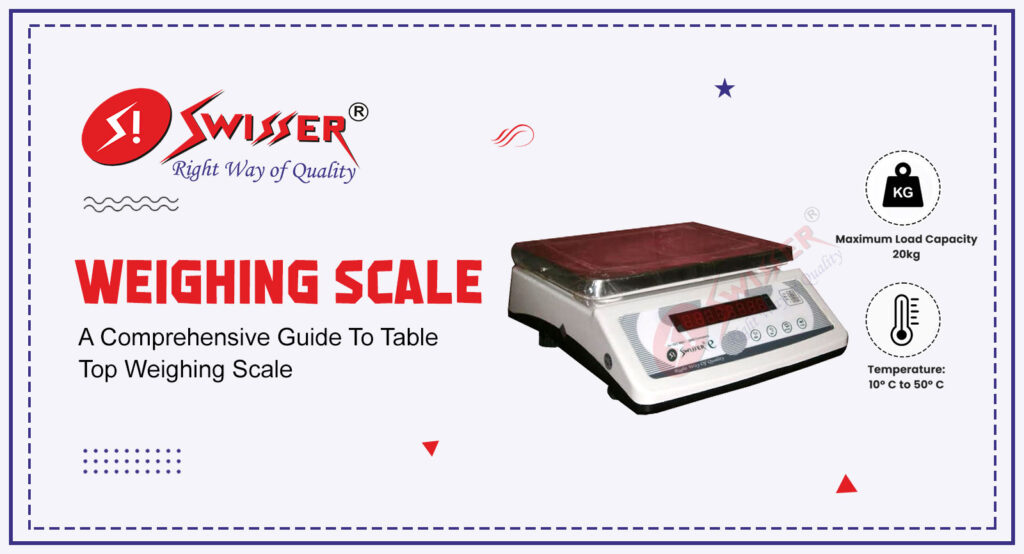HomeBlogTable Top Weighing ScaleA Comprehensive Guide To Table Top Weighing Scale
A Comprehensive Guide To Table Top Weighing Scale

Among the diverse array of weighing scales available, the Table Top Weighing Scale is widely chosen for its versatility, ease of use, and accuracy. In this comprehensive guide, we will provide you with information on table top weighing scales, exploring their features, applications, and factors to consider before making a purchase.
Table Top Weighing Scales
Table top weighing scales, as the name suggests, are scales designed to be placed on a flat surface such as a table or countertop. They are available in a variety of shapes, sizes, and patterns to meet individual demands and interests. These scales typically feature a platform on which the items to be weighed are placed and a display unit that shows the weight readings.
Applications Of Table Top Weighing Scales
Kitchen and Culinary Use
Tabletop weighing scales are indispensable tools in the kitchen, enabling precise measurement of ingredients for recipes. Whether you’re a home cook or a professional chef, these scales ensure consistency and accuracy in cooking and baking.
Commercial and Retail Settings
In retail environments such as grocery stores, delis, or farmer’s markets, tabletop weighing scales are used to weigh produce, meats, and other items for sale. They play a crucial role in ensuring fair pricing and meeting regulatory standards.
Laboratory and Scientific Experiments
In laboratories, accuracy is paramount. Table Top Weighing Scales are essential for measuring chemicals, compounds, and other substances with precision, contributing to the reliability and reproducibility of scientific experiments.
Postage and Shipping
For businesses involved in shipping and logistics, tabletop weighing scales are invaluable for accurately determining the weight of packages and parcels, facilitating efficient and cost-effective shipping processes.
Key Features to Consider While Buying Table Top Weighing Machine
Accuracy and Precision: Look for scales with high precision and accuracy, especially if they are intended for scientific or commercial use where precise measurements are crucial.
Capacity: Consider the maximum weight capacity of the scale and ensure it meets your requirements. Scales with higher capacities are suitable for weighing bulkier items, while those with lower capacities are ideal for smaller items.
Units of Measurement: Check if the scale supports different units of measurement such as grams, ounces, pounds, and kilograms, depending on your specific needs and preferences.
Tare Function: The tare function allows you to reset the scale to zero after placing a container or vessel on the platform, enabling you to measure only the weight of the contents inside the container.
Platform Size and Design: The size and design of the platform should accommodate the items you intend to weigh comfortably. Consider the material of the platform as well, opting for durable and easy-to-clean surfaces.
Display: Ensure that the display unit is easy to read, with clear and legible digits. Some scales come with backlit displays for better visibility in low-light conditions.
Maintenance and Care of Table Top Weighing Scales
Proper maintenance and care are essential for prolonging the lifespan and accuracy of tabletop weighing scales. Here are some tips:
- Clean the scale regularly, removing any debris or residue that may accumulate on the platform.
- Avoid overloading the scale beyond its maximum capacity to prevent damage.
- Calibrate the scale periodically to ensure accurate readings, following the manufacturer’s instructions.
- Store the scale in a dry and stable environment away from direct sunlight and extreme temperatures.
Conclusion
Tabletop weighing scales are versatile tools with a wide range of applications across various industries and settings. Whether you’re weighing ingredients in the kitchen, conducting scientific experiments in a laboratory, or pricing items in a retail store, having a reliable tabletop scale is very beneficial. You can choose the right scale to meet your specific needs, By understanding the aforementioned key features and factors to consider. Additionally, an ideal scale ensures accuracy, efficiency, and reliability in your weighing tasks.
